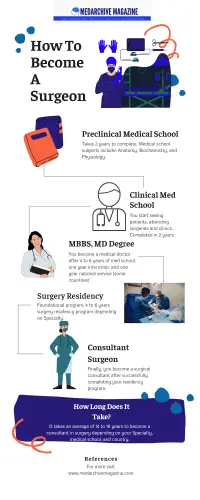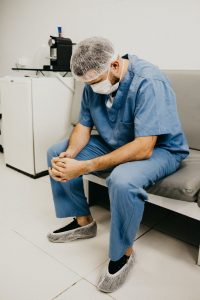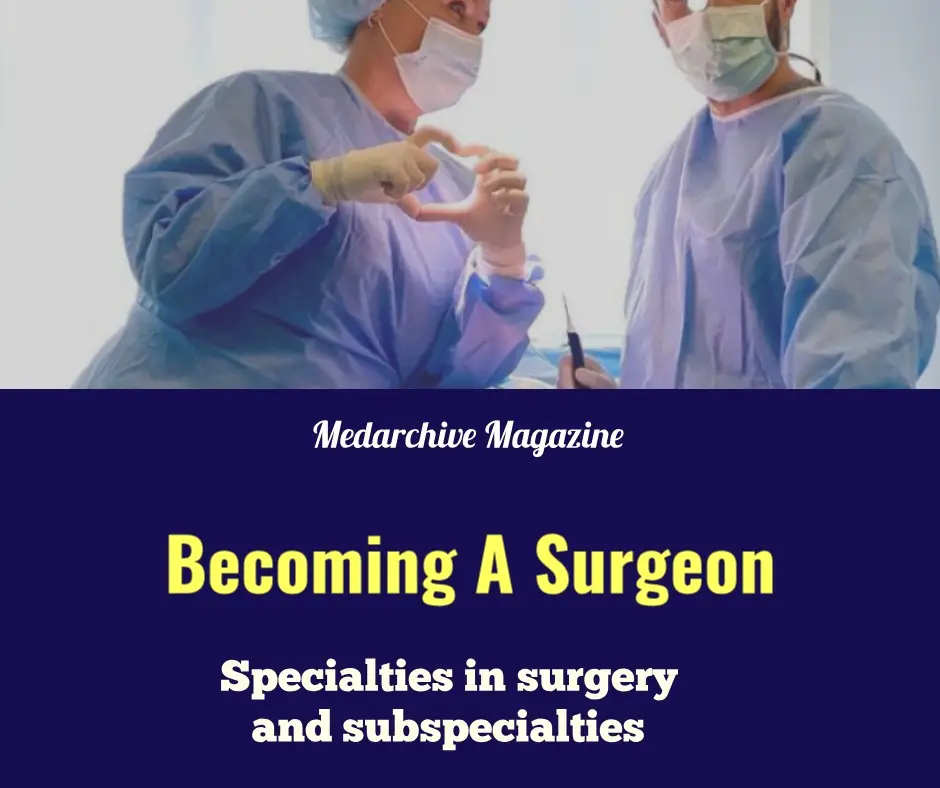Specialties in surgery are diverse and versatile. Surgery is an applied science where specially trained doctors use instruments, knowledge, and techniques to diagnose and treat conditions that affect the body.
Becoming a surgeon is a long and difficult process. The specialties of surgery also determine the intensity and length of your training.
For instance, a surgical specialty like General Surgery takes a minimum of 4 years to complete the residency program after 4 to 6 years of medical school (depending on how long medical school is in your country). Medical schools in Nigeria take a minimum of 6 years for one to become a doctor.
On the other hand, a surgery specialty like Neurosurgery takes a minimum of 6 years to complete the residency program after medical school.
This article gives a birds-eye view and some information on what it takes to become a surgeon with a description of all the surgery specialties, what each surgical specialists do, and some of the surgery subspecialties under it.
Table of Contents
- General Requirements One Need To Become A Surgeon
- What Are The Steps To Become A Surgeon?
- List Of Different Types of Specialties in Surgery and Some of their Subspecialties
- Frequently Asked Questions
- How Long Does it take to become a surgeon (Consultant)?
- What Degree Do You Need To Become A Surgeon?
- What is the hardest surgical specialty?
- What is the easiest surgical specialty?
- Which surgery specialty is the best?
- Can Anyone Become A Surgeon?
- Choosing a Medical or Surgical Specialty Based on Your personality type
- Conclusion
What is a Surgery Specialty?
A surgery specialty or a surgical specialty is any of the various branches of surgery that deals with the treatment and diagnosis of diseases affecting a particular tissue(s), organ, or functionality in the human body by the use of instruments and recommended techniques.
The specialties of surgery are overlapping and sometimes a particular person may need multiple surgeries conducted by surgeons in different specialties of surgery for complete treatment.
Who is A Surgeon or A Surgical Specialist?

A surgeon is a doctor who has completed his/her residency training in any of the specialties of surgery.
Surgeons use a variety of tools to diagnose and treat illnesses. But the mainstay of treatment in surgery is removing or modifying that part of the body that is dysfunctional not just the prescription of medications and therapies.
General Requirements One Need To Become A Surgeon
Just like other medical specialties, becoming a surgeon requires long years of intensive training.
These requirements encompass personalities, character development, medical education and surgical training one needs to become a surgeon.
Some of the requirements include;
Academic Requirements To Become a Surgeon
1. A Bachelor in Medicine and Surgery Degree
This is also known as MBBS in some places. And some call it Doctor of Medicine (MD). But they all require 4 to 6 years of medical school training to attain.
2. Internship and Foundational Programs
The medical internship is a one-year training that newly graduated medical doctors engage in, in order to receive their license as medical practitioners after medical school.
The foundational program is a 2 to 3-year program in which medical doctors who want to go into specialization in a medical or surgical specialty pass through in order to be accepted into a specialist training program or residency program.
3. Residency Program
A residency program is special training that doctors undergo in various specialties to obtain their permanent license to practice freely anywhere in the country.
When medical doctors complete a residency program in any medical or surgical specialty, they are called Consultants. This is the generally recognized highest level of training anyone can get as a medical doctor.
Also, consultants who received their training in any of the specialties under surgery are called Surgeons.
- How Long Is Surgery Residency?
The duration of surgery residency depends on the specialty, the teaching hospital of training, and also the country.
But on average, surgery residency programs all over the world last for a minimum of 4 to 6 years. 4 years for surgery specialties like General Surgery, and 6 to 7 years for the likes of Neurosurgery.
Other Requirements You May Need To Become A Surgeon
These other requirements are characters, special interests, and personality traits you might need to develop if you would like to go into surgery residency;
- A Good Knowledge of Anatomy
Some studies have shown that a link exists between medical students who preferred or performed better in anatomy during medical school as compared to other medical school subjects.
Anatomy is the study of various parts of the body, their development, tissue composition, and how they relate to one another. Good knowledge of anatomy is one of the things it takes to be a good surgeon.
Download Anatomy and Physiology Colouring Workbook Answers PDF
- Endurance
Most surgeries are done while standing erect. And many of these surgeries require that you stand for long hours. It could range from over 4 to 8 hours and more. There have been some reports of Neurosurgical procedures that lasted more than 12 hours.
So endurance is a character that every aspiring surgeon must develop not just for the length of the surgeries but also as a coping mechanism for the burnouts which are experienced by many healthcare workers.
- Altruism
Surgeons are selfless, have regards for themselves and other human beings. They also have elements of kindness and empathy in their dealings with their patients.
- Courage
It takes a lot of courage to cut open another human’s body even if it is to save a life. This courage is one of the things that surgeons are known for.
- Precision
All surgical procedures require a minimum level of precision and good coordination between the mind and the hands.
Surgery is both an art and a science. The art lies in the fine coordination of hand movements while the science stems from the understanding of surgical principles.
Good surgeons are known for conducting operations while doing minimal or zero harm to the patient and at the same time removing the primary cause of the patient’s infirmity. This requires some level of precision and accuracy.
- Creativity
The ability to improvise in a setting where the major instruments needed to carry out a major or minor surgery especially in low economic settings is part of what defines a good surgeon.
Improvisation implies using another instrument in the place of the ideal instrument specially made for a particular procedure. Or using a technique that requires minimal access to the patient’s body with the aim of reducing potential harm.
- Mindfulness
Ever heard of a surgeon who dozes off during surgery? Mindfulness is a trait that every surgeon should have in order to be aware of all the happenings, actions, and inaction during surgery.
This is because, after each surgery, the Surgeon in charge of a procedure is expected to write a report of the surgery which is filed and documented for both educative, therapeutic and legal purposes.
- Excellent Communication Skills
Certain aspects of surgery were having excellent communication skills matters include;
- Counselling a patient for a procedure
- Breaking bad news and
- Teaching.
What Are The Steps To Become A Surgeon?
The steps to becoming a surgeon could be summarized as;
- Primary and Secondary school education
- 4 to 6 Years of medical school
- One year internship
- 2 to 3 Years foundational program
- 4 to 6 Years of Surgery Residency Program
- 1 to 3 Years of Fellowship
- Consultant Surgeon

List Of Different Types of Specialties in Surgery and Some of their Subspecialties
Below is a list of the different specialties of surgery:
- General Surgery
- Neurosurgery
- Paediatrics Surgery
- Urology
- Plastic Surgery
- Orthopedic Surgery
- Otolaryngology / Ear Nose And Throat
- Ophthalmology
- Obstetrics and Gynecology
- Dental Surgery
- Cardiothoracic Surgery
- Vascular Surgery
General Surgery
General surgery is one of the specialties in surgery that deals with the abdomen and its contents, some minor breast surgeries and some other minor surgeries.
Residency in general surgery takes a minimum of 4 years to complete and 1 to 2 years of fellowship.
Examples of abdominal contents that general surgeons handle include; the esophagus, stomach, small intestine, large intestine, rectum, pancreas, liver, gall bladder, appendix, and bile ducts.
Other parts of the body which you may find a general surgeon handling include; the breasts, thyroid glands, and skin with surrounding appendages.
Some Common diseases and surgical procedures by general surgeons include;
- Oesophageal reflux
- Hernias
- Stomach surgery
- Breast lump and cancer
- Intestinal surgery
- Some fistulas
- Soft tissue trauma
- Endoscopic procedures like gastroscopy and colonoscopy
- Accidents and Trauma
- Burns
- Peripheral artery disease
- Appendicectomy
- Cricothyroidotomy
- Thoracostomy
- Fasciotomies
- Emergency laparotomy
- Stanch bleeding
- Cholecystectomy
- Colorectal surgery
Neurosurgery
This specialty of surgery is majorly concerned with the diagnosis and treatment of disorders of the central and peripheral nervous systems.
To become a neurosurgeon requires a residency program that lasts at least 6 years.
The parts of the body handled by neurosurgeons include; the brain, the spinal cord and column, and all the peripheral nerves of the body.
Common Conditions Managed By Neurosurgeons and Some Procedures Include;
- Neuroblastoma
- Central nervous system tumors
- Peripheral nervous system tumors
- Ventriculoperitoneal shunts
- Cerebrovascular accident
- Clipping of aneurysms of vessels in the central nervous system
- Corpus Callostomy
- Hemispherectomy
- Skull base surgery
- Seizures
- Stroke
- Congenital neurological conditions
- Other Oncological conditions of the nervous system
Paediatrics Surgery
Paediatrics Surgery is a very broad surgical specialty that deals with the diagnoses and treatment of surgical disorders in children and adolescents.
Pediatrics surgery cuts across all other specialties of surgery but is adapted to match the needs and problems faced by the pediatric population.
It takes a minimum of 5 years to complete your pediatrics surgery residency.
Pediatrics surgery has other surgery subspecialties under it
- Neonatal Paediatrics Surgery
- Fetal Surgery
Other specialties of surgery have specialized surgery subspecialties dedicated to the treatment and management of pediatric cases and they include;
- Pediatric Urology
- Pediatric Neurosurgery
- Pediatric Orthopedic surgery
- Pediatrics Otolaryngology
- Pediatric Ophthalmology
- Pediatric Dental surgery
- Pediatric Cardiothoracic surgery
- Pediatric emergency surgery
- Pediatric Oncological Surgery
- Pediatric plastic surgery
Some Common Diseases Paediatric Surgeons Manage;
- Cleft palate
- Posterior urethral valve
- Spina bifida
- Burns
- Tumors of the gastrointestinal tract
- Congenital heart defects
- Disorders of the nervous system
- Hypospadias and Epispadias
Urology
This is a surgical specialty that deals with the surgical diseases of the male and female urinary systems and the male reproductive organs.
Organs that Urologists handle include; the kidneys, ureters, urinary bladder, urethra, and the male reproductive organs (the testes, vas deferens, epididymis, prostate, seminal vesicle, and penis).
Urology residency takes a minimum of 5 years to complete.
Common Diseases and Procedures in Urology include;
- Benign prostatic hyperplasia
- Bladder cancer
- Bladder stones
- Vasectomy
- Cystitis
- Testicular cancer
- Prostate cancer
- Retrograde pyelogram
- ‘Erectile dysfunction
- Prostatitis
- Kidney Transplant
- Interstitial cystitis
Plastic Surgery
Plastic surgery is a specialty in surgery that deals with the reconstruction, restoration, or alteration of the human body.
Two major surgery subspecialties under it are reconstructive surgery and cosmetic surgery.
While reconstructive surgery deals with the rebuilding and regeneration of broken or worn-out body tissues as in craniofacial surgery, hand surgery, microsurgery, and burns, cosmetic surgery deals with improving the appearance of the body (aesthetics surgery).
To become a plastic surgeon, you undergo a residency program that takes at least 5 years to complete.
Some techniques utilized in plastic surgery include;
- Autografts
- Allografts
- Xenographs
Common surgical conditions managed by plastic surgeons include;
- Burns
- Breast reconstruction
- Butt reconstruction
- Maxillofacial disorders
- Carpal tunnel syndrome
- Blood vessel reconstruction
- Hypospadias and Epispadias
- Cleft lip and palate
Orthopedic Surgery
This specialty of medicine deals with the prevention, diagnosis, and treatment of bone deformities, and disorders of the joints, ligaments, tendons, and muscles.
Orthopedic surgeons handle all parts of the musculoskeletal system including the hip, knee, foot, ankle, shoulder, elbow, hand, and spine.
It takes not less than 5 years of residency training to become an orthopedic surgeon.
Common disorders which Orthopedic surgeons manage include;
- Sports injuries
- Tibia vara and valgus
- Bone tumors
- Arthritis
- Osteoporosis
- Back pain
- Ruptured vertebral discs
- Spinal stenosis
- Carpal tunnel syndrome
- Arthritis
- Club foot
- Hand and foot injuries
- Hip dysplasia
- Orthopedic trauma
Otolaryngology / Ear Nose And Throat
Otolaryngologists are also known as ENT doctors or Otorhinolaryngologists are surgical specialists that deal with the prevention, diagnosis, and treatment of disorders of the head and neck with a major focus on the ear, nose, and throat.
This also involves the surgical treatment of some cancers and benign tumors of the head, neck, and base of the skull.
Residency training in Otolaryngology takes a minimum of 5 years to complete.
Common diseases in Otolaryngology include;
- Oral cancers
- Oropharyngeal carcinoma
- Laryngeal cancer
- Hypopharyngeal carcinoma
- Sinonasal carcinoma
- Otitis media
- Otitis externa and intima
- Nasopharyngeal carcinoma
- Skin cancer of the head and neck
- Thyroid cancer
- Tumors of the salivary gland
- Head and neck sarcoma
- Parathyroid tumour
Ophthalmology
Ophthalmology is a specialty in surgery that deals with the prevention, diagnosis, and treatment of the various diseases of the eye, orbit, and surrounding tissues (adnexa).
It takes a minimum of 4 years to complete residency training in ophthalmology.
Common disorders which Ophthalmologists manage include;
- Myopia (Short sight)
- Hypermetropia (Long sight)
- Presbyopia
- Cataract
- Glaucoma
- Eye tumors like retinoblastoma
- Proptosis
- Diabetic retinopathy
- Dry eye syndrome
- Conjunctivitis
- Macular degeneration
- Refractive errors
- Strabismus
- Uveitis
- Chalazion
- Pterygium
Obstetrics and Gynecology
Obstetrics and gynecology is a branch of surgical specialty that deals with the prevention and treatment of a wide range of diseases affecting women and unborn babies.
Although Obstetrics and Gynecology are closely related, Obstetricians are also Gynecologist and vice versa.
But Gynecologists deal mainly with the reproductive health of women right from the onset of menstruation (menarche) through their reproductive years up till menopause and beyond.
On the other hand, Obstetricians are mainly concerned with the health and well-being of a pregnant woman and her baby right from the moment the woman conceives, through labor up till the postpartum period.
To become an Obstetrician and a Gynecologist, one needs at least 5 years of residency training in recognized college obstetricians and gynecologists.
There are many surgery subspecialties under obstetrics and gynecology some of which are;
- Maternal and child health
- Female Reproductive health
- Urogynecology
- Gynecological oncology
- Fertility
Some of the commonest conditions managed by Obstetricians and Gynecologist include;
Obstetricians;
- Abortions and Miscarriages
- Preeclampsia
- Ecclampsia
- Antepartum hemorrhage
- Postpartum hemorrhage
- Normal and Abnormal labour
- Antenatal Booking and Monitoring
- Assisted Reproductive techniques
Gynecologists;
- Cervical cancers
- Endometrial cancers
- Vulval and Vaginal cancers
- Vaginal prolapse and fistulas
- Urinary incontinence in women
- Abnormalities of the menstrual cycle
- Abnormal uterine bleeding
- Contraception
Dental Surgery
Dental surgery also known as dentistry or dental and maxillofacial surgery is not strictly a specialty of surgery, rather it is a full course on its own for many teaching hospitals.
Medical students who are trained to become dentists receive almost the same training as medical doctors, but in this case, dentists also receive special training in the prevention, diagnosis, and treatment of maxillofacial disorders including the oral cavity.
The major prerequisite for becoming a dental surgeon is having a Bachelor in Dental Surgery (B.D.S) degree, Doctor of Dental Medicine, or Doctor of Medicine Degree.
Some surgery subspecialties under dentistry include;
- Dental Anesthesiology
- Dental Public health
- Endodontics
- Oral and Maxillofacial surgery
- Dentofacial orthopedics
Common conditions managed by dentists include;
- Dental caries
- Dental restoration
- Dentures
- Dental implants
Cardiothoracic Surgery
Cardiothoracic surgery is a specialty of surgery that deals with the surgical management of the diseases of the thoracic cavity and its surrounding tissues and organs which include the heart, lungs, pleura, thymus, esophagus, great vessels, and other mediastinal structures.
Residency training to become a cardiothoracic surgeon takes a minimum of 4 to 6 years.
Some Conditions Managed By Cardiothoracic surgeons include;
- Congenital heart malformations
- Complications from Rheumatic fever
- Complications from infective endocarditis
- Open heart surgeries
- Modern-beating heart surgery
- Heart harvesting and transplant
- Robotic-assisted heart surgeries
- Pediatric cardiovascular surgeries
- Lung volume reduction surgeries
- Lung cancer
Vascular Surgery
Vascular surgery is of the specialties in medicine that specializes in the management of the diseases of the vascular system (arteries and veins) and the lymphatics.
Vascular surgeons utilize minimally invasive techniques to achieve this.
To become a vascular surgeon, you need to complete residency training first in general surgery for 4 to 5 years followed by a specialized 1 to 2 years of fellowship in vascular surgery.
Some of the conditions managed by vascular surgeons include;
- Arteriosclerosis
- Trauma
- Aneurysms
- Arterial catheterization
- Venous Catheterization
- Other vascular diseases
Frequently Asked Questions

How Long Does it take to become a surgeon (Consultant)?
Subtracting the primary and secondary education and other degrees and undergraduate programs outside medicine and surgery, the least specialty of surgery will take a minimum of 14 years to complete and other specialties in surgery might take as long as 17 years.
This includes;
- The years of premed and medical school
- Internship
- National service
- Foundational programs
- Residency and
- Fellowship
This is how much schooling one needs to become a surgeon, and sometimes it can take longer than that.
What Degree Do You Need To Become A Surgeon?
You do not need to have a degree prior to entering medical school before you can join any of the specialties in medicine.
Although you might need to have a degree as a requirement to get admission into some medical schools. Having a degree boosts your portfolio and adds to your credentials but does not really change much in terms of the training you will receive as a surgeon.
What is the hardest surgical specialty?
It will be highly subjective to just list out the hardest specialties in surgery without using a parameter for analysis.
Each of the specialties of surgery has their own challenges irrespective of the number of years it take for successful completion of the residency program. But when you measure the level of difficulty a surgery residency program can be based on the level of competitiveness, you can be able to objectively measure which ones are the hardest.
According to a study by Med Students Gateway in the United States, the surgical specialties were ranked based on the ones that are most competitive, moderately competitive, and mildly competitive based on the level of competition needed to get matched into the program. And below are the results from the analysis;
The Most Competitive Specialties in Surgery;
- Cardiothoracic surgery
- General Surgery
- Neurosurgery
- Orthopedic surgery
- Ophthamology
Moderately Competitive Specialties in Surgery
- Otolaryngology
- Plastic surgery
- Urology
Mildly Competitive Specialties in Surgery
- Obstetrics and Gynecology
- Pediatrics Surgery
Also, Read; Best Medical Specialties for Female doctors
What is the easiest surgical specialty?
There is no easy surgical specialty, but using the data above, you find that Obstetrics and gynecology, and pediatrics surgery are the least competitive specialties of surgery.
Which surgery specialty is the best?
It is also difficult to say which surgery specialty is the best without having an objective parameter for judgment.
Every surgery specialty is good, it all depends on your needs and goals in life.
But ranking the best surgical specialties based on how much they earn will mean that surgery specialties like Neurosurgery, Plastic Surgery, and Cardiothoracic Surgery will take the lead. But on the other hand, Neurosurgery and Cardiothoracic surgery have been associated with increased stress and burnout among these surgeons.
In looking for the best surgery specialty to go for, it is good you judge them based on the following before making a decision;
- Your plans and dream in life
- The salary
- Years of study
- Balanced work life
- Stress and burnout levels
Can Anyone Become A Surgeon?
Some medics still ask themselves; ‘can I become a surgeon?’
The answer to this question could be reflected on using the words of Henry Ford;
“Whether you think you can or you think you cannot, you are right either way”
Choosing a Medical or Surgical Specialty Based on Your personality type
There have been lots of claims online about personality tests that tell one which specialty is best for them. Such personality tests even though they could go a long way to predict one’s behavior and personality traits, they do not override the power of the will to take up a task upon oneself like choosing a specialty.
But they could serve as a mirror to screen oneself for strengths and weaknesses which are to be developed and worked on respectively.
One of such tests by this website is based on a study carried out among surgeons and clinicians in a university teaching hospital in the United States.
You can take the test using the link below and share your thoughts about it.
Take The Clinician Vs Surgeon Personality Test
Conclusion
Gokul Thiruvalla once said that “If the concentration is an art, then the surgeon may be the greatest artist”. Surgery is a very beautiful specialty with multiple subspecialties and branches which are unique in their roles but constructive in the care of the human body. But to become a surgeon takes long years of hard work, patience, and resilience, but only those who persevere till the end will be called surgeons.
Other Related Posts


